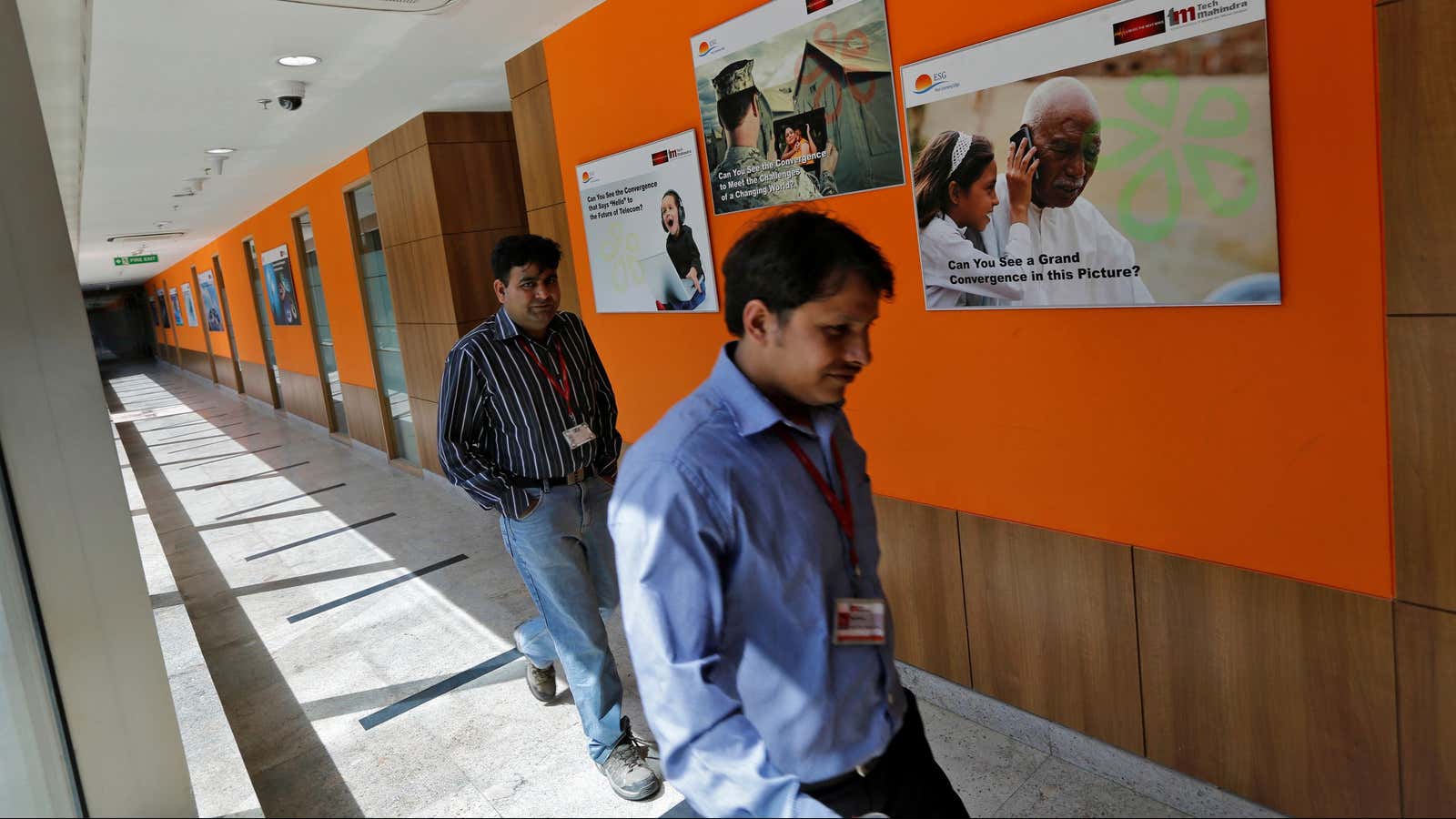An undergraduate degree in computer engineering was highly coveted in India until just a few years ago. It not only ensured job security but was also often a ticket to live and work in the US or the UK.
Lately, though, this has changed.
The rise of automation is taking away low-end jobs that have been popular in the Indian IT outsourcing industry for decades, which means sector leaders like Infosys and Wipro have gone slow on job creation. In addition, as industries look to adopt new technologies such as artificial intelligence (AI) and the internet of things (IoT), techies in India are under immense pressure to reskill. And then there are regulatory issues in the US and the UK, countries that account for over 75% of the Indian IT revenues, taking the sheen off overseas assignments.
“Skills are a key challenge for the industry,” said Debjani Ghosh, president of India’s IT trade body Nasscom. “Is digitisation going to lead to job losses is a question everyone is asking. It is, in fact, going to create new jobs but they’ll need a completely different skill set.” Ghosh was speaking to the press during the Nasscom Technology and Leadership Forum (NTLF), an annual flagship event of the industry body, in Mumbai on Feb. 20.
In 2019, skills will continue to be the new currency, while hiring is unlikely to accelerate much, according to a survey by Nasscom.
Skill is the new currency
In fiscal year 2019, Indian IT industry’s export revenue is estimated to cross $137 billion (Rs9.7 lakh crore), up from $126 billion in the year prior, according to Nasscom.
To keep up the momentum, the first priority for tech organisations is to invest heavily in digitisation, according to Nasscom’s maiden CEO survey where 100 head honchos across IT services firm, software product companies, research units, and startups participated. The survey was released at NTFL.
Almost 90% of the responses in the survey said that updating skills are key. Advanced analytics and AI emerged as the most significant areas for more than half of the CEOs in terms of tech spending, followed by hybrid cloud and cybersecurity.
“Skilling has been a priority for organisations in the industry, to adapt to the digitally transforming operations and the industry now has over 600,000 digitally skilled professionals,” Nasscom said in a press release. “Setting up innovation hubs in key markets and enhanced focus on products and platforms are key investments being done by the industry for digital capabilities.”
Nasscom also launched a Future Skills portal on Feb. 19, which it hopes will serve as a marketplace and content library for courses and certifications for engineers. “Not only will this platform proliferate access to talent by training more people it will also increase the visibility of the talent by connecting Nasscom’s member organisations to them,” said Rishad Premji, Nasscom chairman and chief strategy officer at IT services firm Wipro.
The immigration debate
More than skills, protectionist policies against India emerged as the biggest concern on the minds of the majority of the CEOs surveyed by Nasscom.
The Donald Trump administration has made a slew of unfavourable tweaks to the work-visa programme over the last year.
Besides the US, Ghosh listed a variety of political factors contributing to the uncertain environment, including the outcome of Brexit in March to the brewing US-China trade war.
Now with Indian companies reducing visa-dependency in overseas markets by hiring local talent in each country, a regular B.Tech degree in India is no longer enough to get a chance to work abroad.
Though not much can be done about Brexit or trade wars, India has opened up a dialogue with the US to influence visa laws, Nasscom said. In the past, the industry body has spent hundreds of thousands of dollars on lobbying efforts in the US.
“We’re appointing spokespeople locally in the US who can better represent Indian IT, we’re working with research houses to present facts, and we’re trying to do marketing to distribute the information,” said Premji.
He also dismissed fears that Indian IT companies’ hiring in the US would mean less intake of talent from India. “There’s a shortage of talent everywhere in the world and companies need to fill the gaps in whatever way works best for them,” Premji said.
